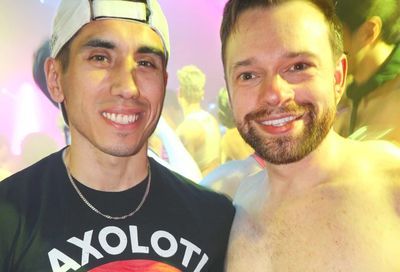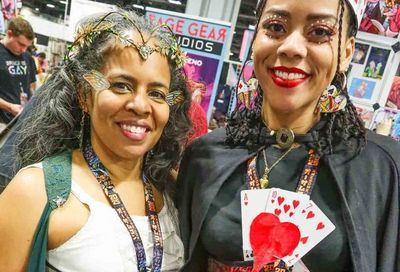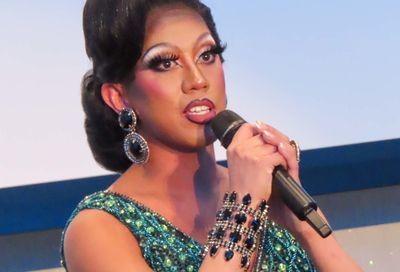Raleigh, Wake County become latest in slew of North Carolina localities passing pro-LGBTQ ordinances
Following the expiration of a moratorium on inclusive ordinances, many cities and counties are now moving to protect their LGBTQ residents.

On Tuesday, the Raleigh City Council voted unanimously to pass a nondiscrimination ordinance protecting residents and visitors from discrimination based on sexual orientation, gender identity, and a host of other characteristics in employment and public accommodations, making it the fourteenth jurisdiction in North Carolina to pass an LGBTQ-inclusive ordinance this year.
Following Raleigh’s passage of the ordinance, all five of North Carolina’s five largest cities — Charlotte, Raleigh, Greensboro, Durham, and Winston-Salem — have similar nondiscrimination ordinances in place.
The city council’s vote came one day after the Wake County Commission, which governs the county in which Raleigh is located, also voted unanimously to approve nearly identical protections based on a person’s sexual orientation, gender identity, natural hairstyle, veteran status, and a host of other characteristics. Earlier this month, commissioners in Mecklenburg County — the county in which Charlotte is located — moved along a similar ordinance, which they will have to approve with a final vote before the county can become the 15th jurisdiction with LGBTQ-inclusive protections.
The trend of localities adopting comprehensive ordinances is the result of a provision that expired last December that had, for three-and-a-half years, barred localities from passing their own nondiscrimination ordinances that go beyond the scope of statewide nondiscrimination laws passed by the North Carolina General Assembly. The provision was part of HB 142, a “compromise” piece of legislation passed to repeal HB 2, the controversial “bathroom” bill targeting transgender people’s access to public restrooms that led to an economic backlash against the state and was one of the key reasons cited for the defeat of then-Gov. Pat McCrory’s (R) re-election bid in 2016.
In addition to its more well-known portions that restrict localities from passing any legislation regarding bathroom access, HB 2 also overturned all existing nondiscrimination ordinances in the state. In early 2017, when the controversial law was repealed with the passage of HB 142, all localities were prohibited from passing nondiscrimination ordinances for nearly three-and-a-half years until December 2020. In addition, the ordinances could not explicitly extend protections allowing people to use restrooms in government buildings that align with their gender identity.
“At the beginning of 2021, every LGBTQ person in our state was left vulnerable to discrimination — but now, ten months in, local nondiscrimination ordinances protect millions of residents,” Kendra Johnson, the executive director of statewide LGBTQ organization Equality NC, said in a statement. “Now, it’s time for state and federal lawmakers to take notice. North Carolinians should be protected no matter where they live or travel, and that requires action from the NC General Assembly and from our U.S. Senators.”
Speaking to Metro Weekly in an interview, Johnson said the unanimous votes in Raleigh and Wake County weren’t surprising, because both are largely progressive jurisdictions, but council members and commissioners were trying to take their time to craft an ordinance that could withstand legal scrutiny.
“There was never really a question about passage, because since HB 2 — even going back to Amendment One [North Carolina’s same-sex marriage ban] — LGBTQ issues have been a huge black eye for the state in terms of how how the the North Carolina General Assembly has moved. I think there was a deep desire to turn the page on that terrible legacy,” Johnson said. “So I think folks were looking at legality through enforcement measures that not would be punitive, but would start to build some culture change.”
Each ordinance has been tailored to the needs of each community, though all contain some protections for employment and public accommodations — sans restrooms, per the provisions of HB 142 that remain in effect to this day and would need to be repealed by state lawmakers. Ordinances in five cities, including Charlotte, Durham, and Winston-Salem, also contain protections for housing, because the General Assembly had previously granted those cities the ability to regulate housing due to direct agreements in place between those jurisdictions and the U.S. Department of Housing and Urban Development.
Johnson noted that grassroots activists had been mobilizing for months prior to the lifting of the ban imposed by HB 142. Some candidates for local office even signed a pledge promising to pass LGBTQ-inclusive nondiscrimination ordinances once it was legal to do so. In March 2020, working with community stakeholders, Equality NC, the Campaign for Southern Equality, Local Progress North Carolina and the LGBTQ Democrats of North Carolina began compiling information that would help guide cities and counties in passing such ordinances, providing legal arguments to justify the passage of LGBTQ protections and encouraging local officials to approve comprehensive ordinances.
“The only things we were really prescriptive about was that cities take their time and put in enforceable measures that would really be able to change the material conditions of the lives of the most marginalized in the state, and that they not be rushed,” Johnson said. “That’s why we saw cities start to take the first steps in January 2021. Since then we’ve seen a steady drumbeat of other cities that have come online.”
The organization formed as part of the coalition’s efforts, “NC is Ready for LGBTQ Protections,” currently co-chaired by Equality NC and the Campaign for Southern Equality, is taking that fight to the grassroots, providing education and guidance to North Carolinians on how they can become involved by lobbying, pressuring, or persuading their elected representatives to pass nondiscrimination ordinances. The coalition’s website even allows individuals to write directly to their local officials. Currently, there are efforts underway in 17 different cities and at least two additional counties (besides Mecklenburg) focused on pushing for nondiscrimination protections for historically marginalized populations.

Support for such ordinances is also believed to be more widespread than thought at first blush. According to a 2019 poll from Public Policy Polling, 67% of North Carolinians said they supported legislation to protect the rights of LGBTQ people. While many North Carolinians may mistakenly believe that LGBTQ people are already protected from discrimination at the state or federal level, advocates have had to spend time educating people that those protections are largely nonexistent, speaking to a need for pro-LGBTQ legislation at all levels of government. According to a recent study by the Center for American Progress, 1 in 3 LGBTQ people, including 3 in 5 transgender people, report having experienced discrimination in the past year, further underscoring the importance of the NC is Ready campaign.
Adam Polaski, the communications director for the Campaign for Southern Equality, said the coalition’s goal has been to expand the number of people who are protected from discrimination, bit by bit, in light of the North Carolina General Assembly’s reticence — at least under Republican control — to pass statewide protections.
“At the beginning of the year, zero percent of the state was protected, and now almost 30 percent is protected, bringing North Carolina in line with with the rest of the country, really,” Polaski said. “In the absence of our state lawmakers taking action, these local leaders have really stepped up and are doing the right thing to address discrimination in their own communities.”
Regarding any potential backlash against the new laws, neither Johnson nor Polaski has seen a groundswell of pushback, although any such ordinances are likely to be challenged in the courts by conservative legal organizations like Alliance Defending Freedom or the Becket Fund for Religious Liberty, which have claimed, in other states, that nondiscrimination ordinances unduly infringe on the rights of religious people who do not wish to condone same-sex marriage, homosexuality, or transgender people’s gender identities.
See also: North Carolina lieutenant governor doubles down on comments calling LGBTQ content “filth”
Johnson noted that Republican leaders in the General Assembly have come out publicly to say that they won’t take any actions against localities that pass nondiscrimination ordinances — so long as they don’t violate current law or the restrictions still in place imposed by HB 142 — instead preferring to leave it up to the courts to determine whether individual ordinances can stand.
“This fight is not over. We’re in the middle of a culture war. But I think backsliding into the debacle that was HB 2 and then HB 142, no one wanted to see that happen,” Johnson said of General Assembly lawmakers’ reticence to intervene in local affairs once more.
I think HB 2 was a real moment for everyone in North Carolina and really around the world to step back and think about transgender people for the first time, and consider their feelings,” Polaski added. “Despite how horrific that law was, I think it also was a galvanizing force for folks to stop and think, ‘Oh, I don’t want to discriminate against people. I don’t want people to be excluded from using the restroom or or being treated with disrespect to my in my own community.’
“I think we’ve had five years basically to reflect on how terrible that law was and how wrong discrimination is. And it’s been encouraging to see that those reflections have led to people feeling like these ordinances are long overdue,” he said. “What we’ve found is that we’ll talk to people on the street and they’ll be shocked that, legally, folks can be turned away from a service like a restaurant or hospitality because of their sexual orientation or gender identity…. So we haven’t seen the backlash that some folks anticipated or expected. And I think that speaks to how far we’ve come as a state. I think it speaks to how far we’ve come as a country. And I also just think it speaks to the power of that reflection from the past five years of experience.”
See also:
Support Metro Weekly’s Journalism
These are challenging times for news organizations. And yet it’s crucial we stay active and provide vital resources and information to both our local readers and the world. So won’t you please take a moment and consider supporting Metro Weekly with a membership? For as little as $5 a month, you can help ensure Metro Weekly magazine and MetroWeekly.com remain free, viable resources as we provide the best, most diverse, culturally-resonant LGBTQ coverage in both the D.C. region and around the world. Memberships come with exclusive perks and discounts, your own personal digital delivery of each week’s magazine (and an archive), access to our Member's Lounge when it launches this fall, and exclusive members-only items like Metro Weekly Membership Mugs and Tote Bags! Check out all our membership levels here and please join us today!





















You must be logged in to post a comment.